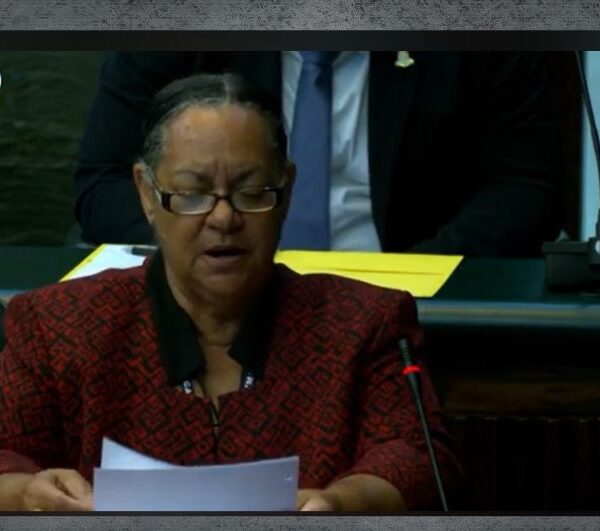
Dwayne Seymour, Minister of Sustainability
|
Getting your Trinity Audio player ready...
|
By Alric Lindsay
In the first sitting of the third meeting of the 2024-25 session of Parliament today, January 31, 2025, Dwayne “John John” Seymour, the Minister for Sustainability & Climate Resiliency, confirmed that the Government is withdrawing the controversial National Conservation (Amendment) Bill, 2024, which sought to amend the National Conservation Act, 2013. As it stands, it will now be open to any future Government to consider what (if any) amendments are appropriate following a full and frank discussion with members of the public.
Proposed changes
As noted in a previous story, the proposals under the National Conservation (Amendment) Bill, 2024 included changes to the composition of the National Conservation Council, changes to the voting powers of members of the Council, the removal of the Council’s power to appoint advisory committees, the introduction of a requirement of Cabinet’s approval before functions of the Council may be delegated to the Director of the Department of the Environment, the introduction of an appeals tribunal and the change of the management of the environmental protection fund from the Council to the Cabinet.
Government’s withdrawal of the proposed amendments
Explaining the reasons for the proposals in the first place, Minister Seymour said:
The undeniable fact is that there are several provisions in the National Conservation Act that has given rise to difficulties and therefore require amendments to address those difficulties.
Some of those difficulties were highlighted in the Court of Appeal judgement in the case of Central Planning Authority versus the National Conservation Council.
He added:
There is a legal policy issue as it relates to the proportionate balance to be struck between the powers given to the NCC to override decisions of our public bodies, potentially including the constitutionally created Cabinet, and the ability of those other public bodies in exercise of their own authorities functions in exercise of their own statutory functions.
There is no denying that the extent to which it is desirable to change that balance is ultimately a political question that can only be constitutionally affirmed by the Parliament which originally enacted the NCA.
Therefore, the proposed amendments would seek to make the legislation more workable without fundamentally undermining the ultimate policy intentional underlying the NCC. In particular, the principle that all public bodies exercising their function should avoid damaging the environment when possible.
He continued:
Where environmental harm is likely to result from a public body’s activity, it should consult with the NCC before embarking on it.
One of the sections of the law that has given rise to the most difficulty is section 41, which imposes a general obligation on all public authorities and in certain cases gives the NCC the power to veto decisions on such public authorities or to require the decisions to be taken only subject to certain conditions dictated by the NCC in practise.
However, the NCC’s role has been discharged in many cases by the Director of the Department of Environment pursuant to a delegated authority rather than by the whole council.
And unfortunately, Mr. Speaker, as highlighted in the Court of Appeal judgement, those actions don’t always conform with the legislation. And at least one case there was a preemptive exercise of the NCC’s veto powers.
Based on the foregoing, Minister Seymour then suggested that several questions need to be seriously considered. These included:
- Should the NCC have limited powers of veto over the decisions of the other public entities, and if yes, under what circumstances?
- Should the obligation to counsel with the NCC before making certain types of decisions apply to Cabinet itself?
- What, if any, changes should be made to the composition of the NCC? A
He added:
All these and many other issues should be discussed in this Parliament at the appropriate juncture to ensure that there is proper realignment of the balance of power under the legislation. Not to gut the legislation as some have suggested, but rather to ensure proper balance.
Minister Seymour highlighted a further concern that under the current National Conservation Act, the Director of the Environment “could restrain the Cabinet,” which he said in his “considered view is entirely untenable.”
He further stated that the NCC is currently in “breach of section 9(6) of the Public Authorities Act.” This states:
(6) The Cabinet may appoint a public or civil servant to a board however (a) notwithstanding any other law, the membership of a board shall not be comprised of more than forty percent public or civil servants; (b) the chairperson shall not be a public or civil servant; and (c) public or civil servant board members shall not be entitled to vote.
Clarifying his view of a breach of the above section, Minister Seymour said that “currently, the Director [of the Environment] has a vote.”
Indicating another purported breach of the Public Authorities Act, Minister Seymour said that the “chairperson shall not be a public or civil servant,” and in the current case, the chairperson of the NCC appears to be the Director of the Environment.
After explaining the foregoing, Minister Seymour said, “It is, therefore, the Government’s intention to withdraw” the National Conservation (Amendment) Bill, 2024.
Note to readers:
For previous stories outlining the details of proposed changes to the National Conservation (Amendment) Bill, 2024, please see the below links:







